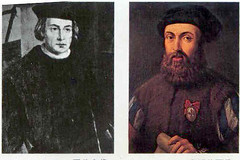 The golden age of Navigation was a golden age of knowledge management, and offers several lessons to KM today.
The golden age of Navigation was a golden age of knowledge management, and offers several lessons to KM today.We are talking about portugal, spain and england in the 15th century, so what on earth has knowledge management got to do with it? Let me explain.
The 15th century Navigators were, absolutely literally, heading off into the unknown, and their lives, as well as their fortunes, were at risk. Knowledge - knowledge of existing discoveries, and where the unknowns still were - was vital to them, and knowledge was their main product on their return (well, knowledge, and shiploads of spice).
Part of the eminence of Portugal in the navigation race was down to the KM techniques of Henry the Navigator. Henry created the Sagres School - the most advanced navigation study and research centre of the time - where he gathered state of the art knowledge on astronomy, cartography and navigation. Before the captains set off on their journeys of discovery, they would visit the Sagres School, talk at length with the captains from previous voyages, study and copy the existing maps, train in the principles of navigation and map making, and read through the exploration journals from previous voyages (usually taking these journals with them, as reference). They would start with as full a cargo of knowledge as they could manage. Then, as they explored, they would capture their own knowledge, in the form of their own journals, and (most important) their own, new, maps. Gradually, voyage by voyage, the white spaces on the maps were filled in, and taken back to the Sagres school to build up the body of knowledge of navigating the new world. This knowledge was a hugely competitive advantage for Portugal, and jealously guarded from Spain and from England - the main competitors for new territory.
So what can this teach the project manager of today? Are there relevant lessons that we can learn from the Navigators?
Yes there are. Wherever a project is exploring "unknown territory" they can follow the principles of Henry the Navigator.
* Learn Before. Visit the knowledge centres (the modern equivalent of the Sagres school). Talk at length with the managers of previous projects (peer assist), study and copy existing processes, read through the lessons from the past, train in the new technologies.
* Learn during. Make your own "map" of the project journey. Fill in the unknowns, using techniques such as After Action review or project blogs to keep journals of the learning.
* Learn After. Bring that knowledge back to the organisation. You are not just delivering the project scope, you are delivering knowledge as well. Fill in the white spaces. Update the knowledge base. Keep the knowledge safe. This is your competitive advantage. Learn from the Navigators - the greatest explorers were the greatest knowledge managers.
Photo from Flickr Creative Commons, originally uploaded by shizhao
Incidentally, I am not condoning the imperialism and slave trading that was associated with these voyages - I am merely pointing out the deliberate and highly effective management of knowledge for competitive advantage. I am sure today's competitive organisations are far more ethical, though perhaps not as consciouly aware of the value of knowledge.




4 comments:
Brilliant post, Nick. I believe that these stories in history tell us more about knowledge management and the fundamental ideas of KM than anything in today's technology. I posted a similar U.S. navigation story a while back (if you're interested: http://ykm.typepad.com/yerfdogs_knowledge_manage/2006/07/what_is_km.html), and so I really appreciated your post. Thanks. - Tom
I would heartily agree with your idea that we can learn about learning by looking at the history of exploration.
I recently did some research into the various expeditions to the South Pole at the beginning of the 20th century, and you can draw simple lessons about learning from the experiences of the three main explorers.
Scott, of course, paid the ultimate penalty for not learning from his own experience, but what really suprised me was that Amundsen's successful journey was relatively so simple, because he learned so much from his own journeys and others.
Cheers,
Alastair
Amundsen certainly learned from the successful voyages of nansen and others. Scott was let down by a number of factors as I understand it - his ponies were poor quality (as the pony-buyer was not an expert), he wouldn't take more dogs because he could not bear to shoot them, and the solder they used on their fuel cans cracked at the extreme temperatures, and the cached cans were found empty on the return journey. And certainly - he could have learned better!
Nick, this is a great story. KM can be such an abstract concept and this brings it to life. Stories, objects and artefacts from the past can be powerful tools for stimulating ideas about the present and the future. We recently completed a two-year programme with MLA London, exploring ways in which museums, libraries and archives can help businesses and entrepreneurs learn from the past, develop ideas and innovate.
Post a Comment